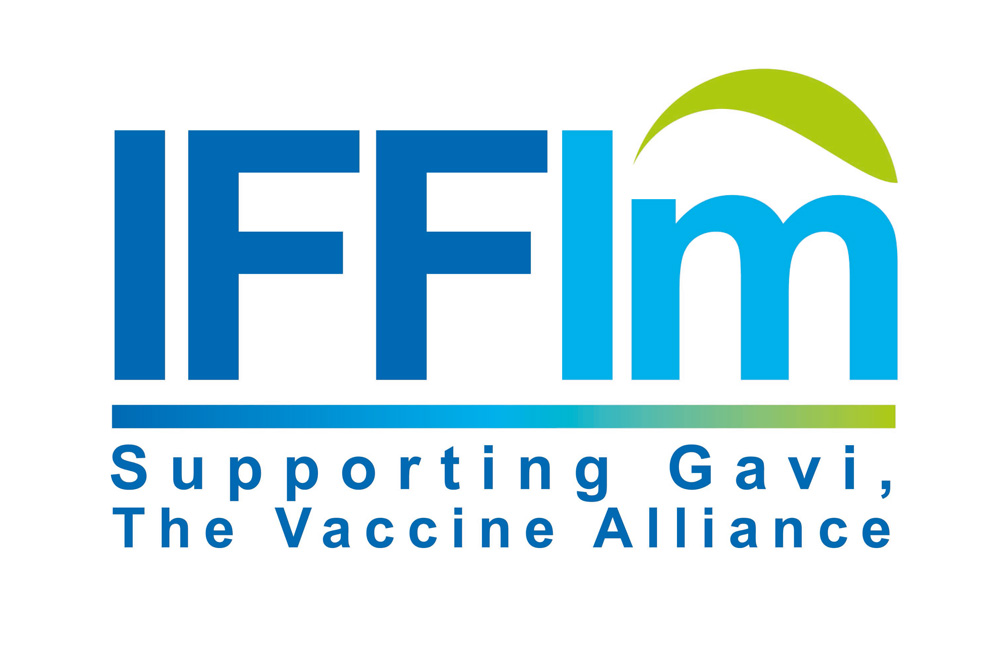Zambia launches major HPV vaccine campaign
- Impact
- Zambia launches major HPV vaccine campaign
Zambia launches major HPV vaccine campaign
6 October 2023
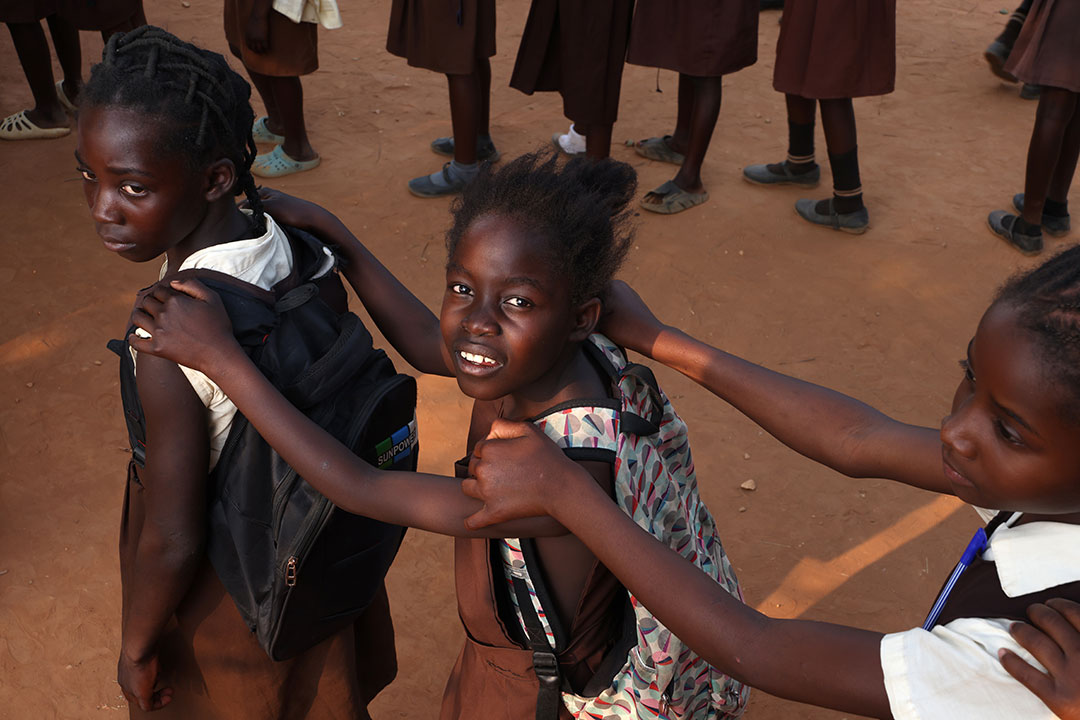
HPV vaccine to prevent cervical cancer is administered to school children at Matipula Primary School in Lusaka, Zambia. Gavi/2023/Peter Cates
Health workers and vaccine advocates hope boosting vaccine coverage rates will turn the tide on the preventable cancer.
Health workers and vaccine advocates hope boosting vaccine coverage rates will turn the tide on the preventable cancer.
Announcements
IFFIm impact: HPV
IFFIm supports Gavi’s HPV programme with funding of US$ 84 million.
The tail-end of September saw a week of marathon days for health centres and clinics around Zambia, and milestone days for Zambian girls.
On 25 September, the Ministry of Health launched a vaccination campaign against the cancer-causing human papillomavirus (HPV). In six days, the health system would aim to immunise more than 1.42 million girls aged between nine and 14 years.

With coverage rates as low as 33% recorded in 2021, the campaign sought to increase the number of girls who are protected against the virus responsible for as many as 95% of cervical cancer cases.
In Zambia, the vaccine has the potential to save thousands of lives a year: cervical cancer is the single deadliest and most common cancer in the country today, with more than 3,000 new diagnoses and almost 2,000 deaths in 2020.
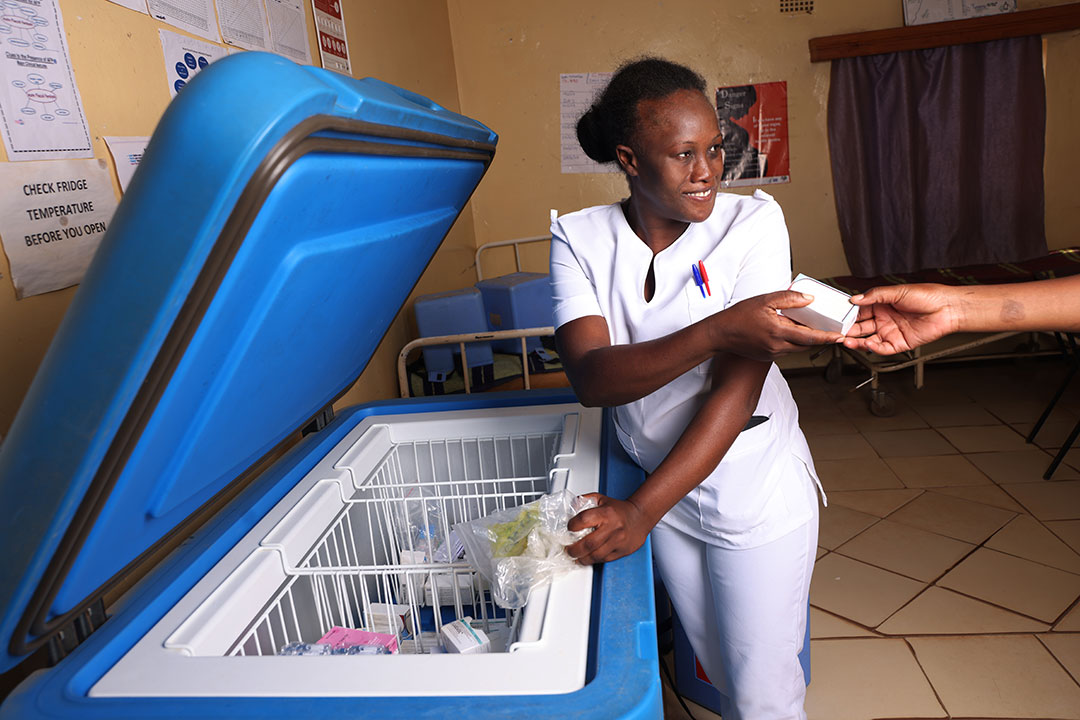
Credit: Gavi/2023/Peter Cates
School outreach
Matipula Primary School is about 40km from Lusaka, Zambia’s capital. On the afternoon of Friday, 29 September, girls lined up in three queues on the school’s grounds. Some girls weathered the jab stoically; others scrunched up their faces. Male peers – who were not eligible for vaccination during the current campaign – stood around in clusters chatting as they watched.
“We were to start the campaign in schools on Monday, but we had to get parental consent, which took most of Monday. So we started to vaccinate here on Tuesday,” said Gift Chongo, the Facility-in-Charge at the nearest clinic, Chongwe Rural Health Centre (RHC).
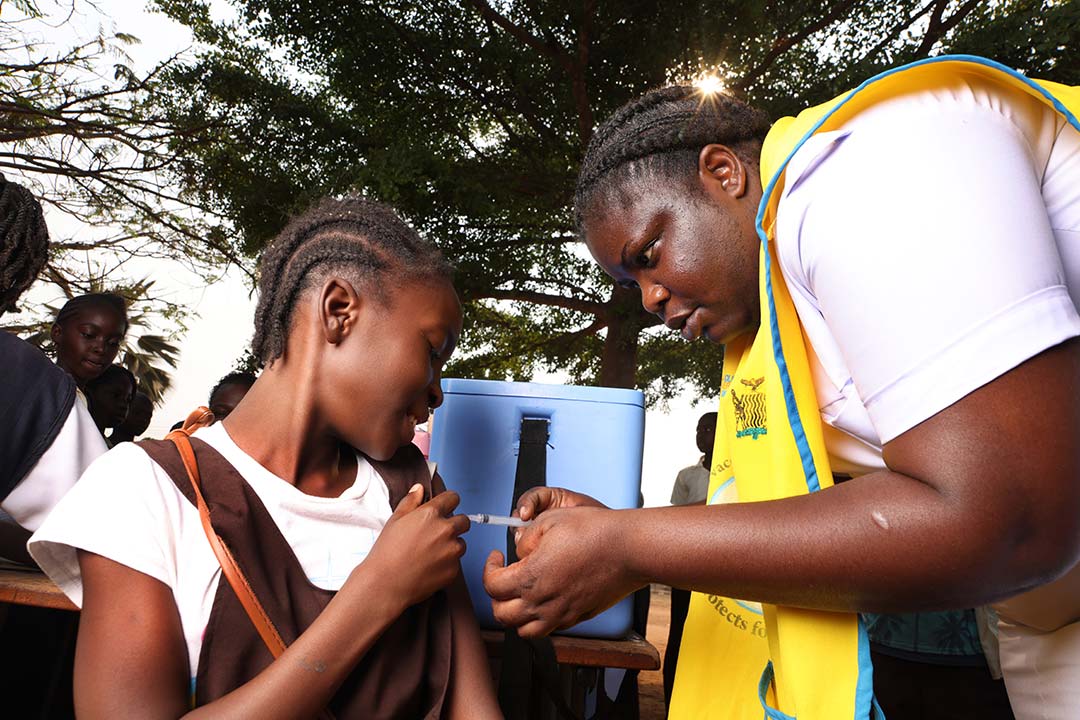
Credit: Gavi/2023/Peter Cates
Guidance and Counselling Officer at Matipula Primary Nampungwe Chitalu said, “We really had to rush to get the consent forms into the hands of parents first thing on Monday. We could not start the campaign at Matipula without parents agreeing. Our target group for us here is girls in grade 3 to grade 7. These grades usually are the ones you find the targeted age group of nine to 14.”
Chongo and Chitalu worked hand in hand to ensure that most of the girls had signed consent forms. A few parents refused.
Chongo explained, “We targeted both government and private schools. I can say that we reached over a thousand girls between ages nine and 14. The majority of parents were very helpful during the consent-form signing. We had a small percentage of parents who said no, but it is my hope that we reach these other parents in the future.”
"My hope is that we can continue to have these campaigns and that women will continue to go for cervical cancer screenings. I believe all this will help us to drastically reduce cases of cancer."
– Grace Muchabe, vaccinator
As the sun started to set over Matipula, Chongo called for reinforcements, as the queues kept on increasing, overwhelming the three nurses who had started vaccinating at the school at 08:00 that morning.
“They are tired. If we leave them alone they might not finish the job until night-time,” Chongo said.
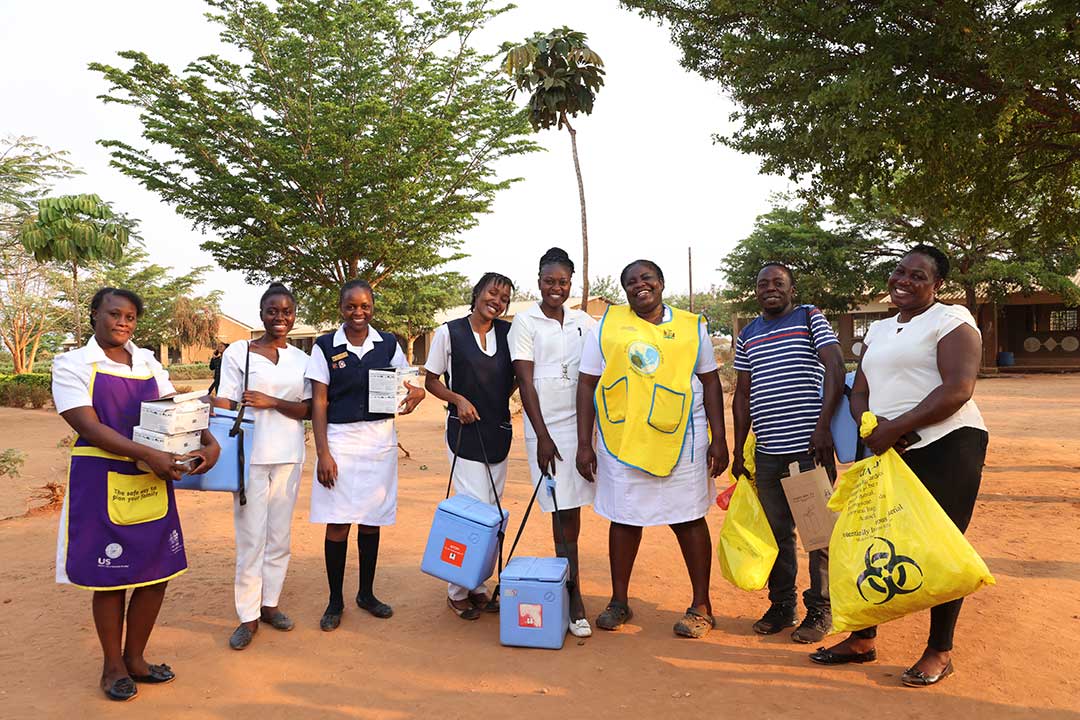
Credit: Gavi/2023/Peter Cates
Among the health workers who worked up to the conclusion of the campaign was Grace Muchabe, a registered nurse with a calm personality, who took on jab-shy children with practised ease.
“My hope is that we can continue to have these campaigns and that women will continue to go for cervical cancer screenings. I believe all this will help us to drastically reduce cases of cancer.” Muchabe said.
Last takers
Saturday, Chongo noted, was quieter. The bulk of campaign’s work, accomplished in a Tuesday to Friday dash, was behind him and his colleagues. Still, he looked on as a smattering of last-minute takers trickled into Chongwe Rural Health Centre (RHC) to claim their government-provided jabs.
"I am neighbours with a Chongwe health worker. She usually gives me information on things like medicines and vaccines that my family needs, so she told me about the HPV vaccine and highly recommended it for my daughters."
– Chongwe resident Josephine Mudenda
Chongwe resident Josephine Mudenda had finally decided that four of her daughters should be vaccinated. Mudenda had initially been reluctant, but a health worker had helped her to understand what vaccination could mean for them.
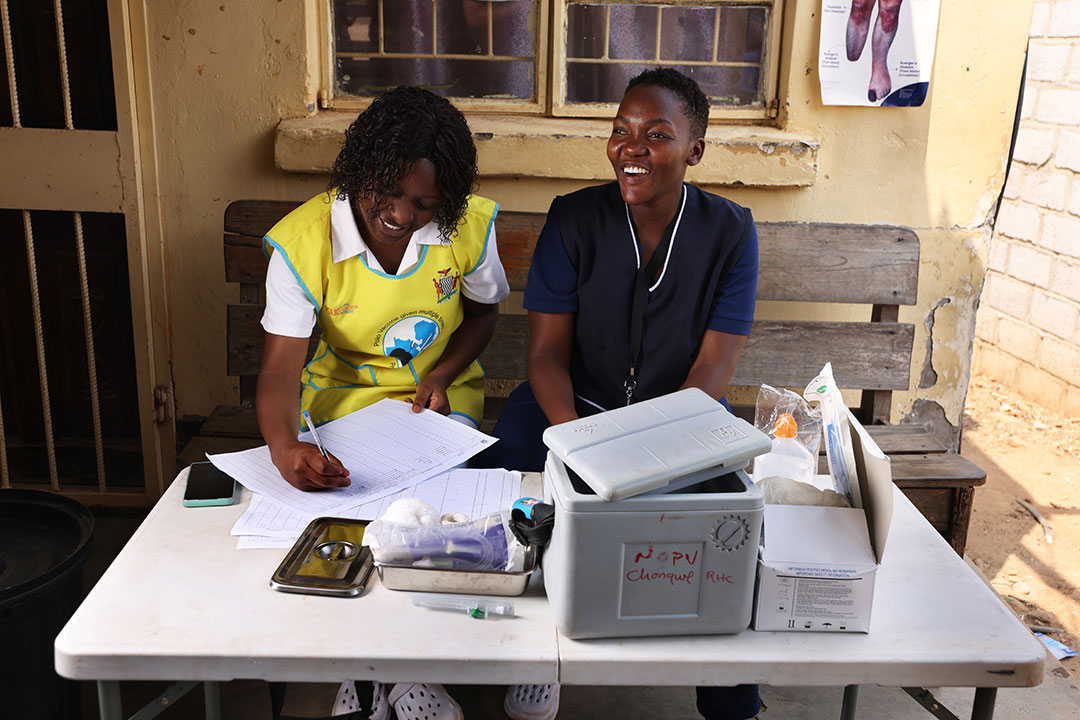
Credit: Gavi/2023/Peter Cates
“I am neighbours with a Chongwe health worker. She usually gives me information on things like medicines and vaccines that my family needs, so she told me about the HPV vaccine and highly recommended it for my daughters. She told me that a cancer that affects a lot of women in Zambia would be prevented in my children as they grow older. My children were not in the targeted schools that were given the vaccine, so that’s why we are here on a Saturday,” Mudenda explained.
"My hope is that in the next 10 to 20 years, we will see a huge reduction in cases of cervical cancer. This vaccine is the first line of defence."
– Karen Nakawala, broadcaster and cervical cancer survivor
Despite a bout of injection-anxiety suffered by one of her daughters – which was settled within a few minutes – all four of Mudenda’s daughters received their vaccinations and were soon on their way home.
"First line of defence"
Even before the campaign kicked off, health workers around the country were supported by civilian allies, who took on misinformation and spoke up on debate platforms that ranged from radio programmes to social media groups.
One notable voice among the campaigners is Karen Nakawala, a Zambian broadcaster and HPV vaccination advocate. When Nakawala was diagnosed with cervical cancer in June 2019 after a routine gynaecology exam, she says her life became a nightmare.
It was only after this ordeal that Nakawala learned that cervical cancer could be prevented.
In an interview with VaccinesWork earlier this year she says, “I remember asking, ‘Okay – how come I haven’t heard about the HPV vaccine?’ And that’s when they told me, ‘No, we’ve been doing it since 2013, but we only give it during Child Health Week.’”
While Nakawala has a daughter who is eligible for the vaccine, she was not vaccinated during the September campaign. “My daughter is in boarding school, her school wasn’t one of the targeted schools during the campaign so she’s yet to get vaccinated,” Nakawala explained.
“My hope is that in the next 10 to 20 years, we will see a huge reduction in cases of cervical cancer. This vaccine is the first line of defence.
“I’m hoping the vaccine can be given on demand. I would like to walk into any health facility with my daughter when she comes back for school holidays and be able to access the vaccine easily,” she added.
 | This article is republished from VaccinesWork under a Creative Commons license. Read the original article. VaccinesWork is an award-winning digital platform hosted by Gavi, the Vaccine Alliance covering news, features and explainers from every corner of global health and immunisation. |
Share this article
Restricted Access Library
 The material in this Restricted Access Library is intended to be accessed only by persons with residence within the territory of a Member State of the European Union and is not intended to be viewed by any other persons. The material in this Restricted Access Library is provided by IFFIm for information purposes only and the materials contained herein were accurate only as of their respective dates. Certain information in the materials contained herein is not intended to be, and is not, current. IFFIm accepts no obligation to update any material contained herein.
The material in this Restricted Access Library is intended to be accessed only by persons with residence within the territory of a Member State of the European Union and is not intended to be viewed by any other persons. The material in this Restricted Access Library is provided by IFFIm for information purposes only and the materials contained herein were accurate only as of their respective dates. Certain information in the materials contained herein is not intended to be, and is not, current. IFFIm accepts no obligation to update any material contained herein.
Persons with residence outside the territory of a Member State of the European Union who have access to or consult any materials posted in this Restricted Access Library should refrain from any action in respect of the securities referred to in such materials and are otherwise required to comply with all applicable laws and regulations in their country of residence.
By clicking Access restricted content: DYNAMIC-LINK-TEXT I confirm that I have read and understood the foregoing and agree that I will be bound by the restrictions and conditions set forth on this page.
The materials in this Restricted Access Library are for distribution only to persons who are not a "retail client" within the meaning of section 761G of the Corporations Act 2001 of Australia and are also sophisticated investors, professional investors or other investors in respect of whom disclosure is not required under Part 6D.2 of the Corporations Act 2001 of Australia and, in all cases, in such circumstances as may be permitted by applicable law in any jurisdiction in which an investor may be located.
The materials in this Restricted Access Library and any documents linked from it are not for access or distribution in any jurisdiction where such access or distribution would be illegal. All of the securities referred to in this Restricted Access Library and in the linked documents have been sold and delivered. The information contained herein and therein does not constitute an offer for sale in the United States or in any other country. The securities described herein and therein have not been, and will not be, registered under the U.S. Securities Act of 1933, as amended (the "Securities Act"), and may not be offered or sold in the United States except pursuant to an exemption from, or in a transaction not subject to, the registration requirements of the Securities Act and in compliance with any applicable state securities laws.
Each person accessing the Restricted Access Library confirms that they are a person who is entitled to do so under all applicable laws, regulations and directives in all applicable jurisdictions. Neither IFFIm nor any of their directors, employees, agents or advisers accepts any liability whatsoever for any loss (including, without limitation, any liability arising from any fault or negligence on the part of IFFIm or its respective directors, employees, agents or advisers) arising from access to Restricted Access Library by any person not entitled to do so.
"Relief" for mothers in Bayelsa state as malaria vaccine makes waves
07 November 2025
